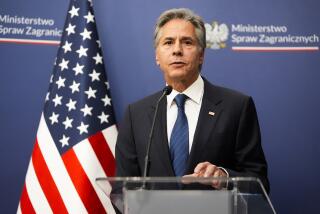Chechens Use Net in Publicity War With Russia
- Share via
MOSCOW — As Russia’s new war in Chechnya gains force and casualties mount, the Chechens are using the Internet to publicize their version of the story and their claims of civilian casualties.
On the opposite side, Prime Minister Vladimir V. Putin has taken personal control of Russia’s effort in the propaganda war, launching a new government information center.
Putin’s move underscores the high stakes for him in the renewed Chechen war. He has gambled his position as the anointed heir to President Boris N. Yeltsin on winning the conflict. He is determined not to repeat the mistakes of the 1994-96 Chechen conflict, in which Russia lost the propaganda war badly and suffered a humiliating military defeat by the Chechen guerrillas.
He flatly denied Thursday that Russian tanks had fired on a bus in northeastern Chechnya on Tuesday, killing dozens of civilians.
But the Chechens had already posted photographs on the Internet showing a bus shot to pieces and the mangled corpses of several female passengers.
“If such an incident had really taken place, Chechens would not have fled to Russia,” said Putin, referring to a flood of more than 100,000 refugees who have left Chechnya since Russia’s heavy bombing began last month.
Putin’s denial came as he launched the Russian Information Center, which he said will prevent distortions and propaganda. In fact, the service will put out only Russian government information.
Russian authorities have made several unsuccessful efforts to close down the Chechen Internet site, www.kavkaz.org, which is operated from Grozny, the capital of the separatist republic. The Chechens use the site to post photos of war damage, run their daily claims of civilian casualties and list which villages are being bombed.
Figures from the opposing sides on casualties and losses in both conflicts always stand in sharp contradiction and are impossible to check reliably.
Reports that a bus was shelled not only bring back dark memories of a similar incident at the outset of the 1994-96 Chechen war, but also recall some of the more tragic aspects of NATO’s bombing of Yugoslavia, a strategy that Russia claims to be emulating.
Col. Gen. Valery Manilov, first deputy chief of staff of Russia’s armed forces, dismissed the reports that his forces fired on the bus as disinformation aimed at spreading fear in Chechnya and misleading the media.
The Russian denials contradicted independent reports from the Chechen capital, notably from Radio Liberty’s correspondent, Khassin Raduyev, who said he saw victims of the bus blast in a Grozny clinic, including a 9-year-old girl and her father. Raduyev also saw video footage of the scene shortly after the bus was hit.
“Just as [Chechen doctors] had finished extracting the bodies and whatever was left of them from the bus, the shelling resumed. One of the doctors was wounded and had to be rushed to the same hospital too,” Raduyev said in an interview.
The Chechens have been able to quickly distribute video footage of Russia’s bombing and shelling campaign. Russia’s RTR television network showed footage it received from Chechnya of the dead being taken from the destroyed bus directly after it aired Manilov’s denial of the incident.
Putin acknowledged that Russia’s failure to close down the Chechens’ Internet site had allowed them to get their story out. “We surrendered this terrain some time ago and now we are entering the game again,” Putin said.
Military analyst Alexander I. Zhilin of the weekly Moskovskiye Novosti said that unlike during the 1994-96 war, popular opinion and Russia’s media are united firmly behind the Russian effort this time.
“Many Russian people want to see this loathsome thing called the Chechen threat crushed under the heavy military boot of the Russian soldier,” Zhilin said. “The Russian media have already launched a propaganda campaign on a tip from the Defense Ministry saying that the [Chechen] terrorists are using civilians as a live shield, thus preparing public opinion for an increase in civilian casualties.”
At times, information on the Russian side resembles primitive propaganda, such as the claims that Baltic female snipers were fighting on the Chechen side, reported in the Moscow daily Sevodnya over the weekend. Identical rumors swept through the Russian forces at the outset of the 1994-96 war, and Zhilin said the same stories were heard during the Afghanistan war as well.
*
lexei V. Kuznetsov of The Times’ Moscow Bureau contributed to this report.
More to Read
Sign up for Essential California
The most important California stories and recommendations in your inbox every morning.
You may occasionally receive promotional content from the Los Angeles Times.













